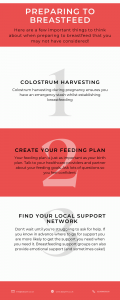Deciding how to feed your baby can be a difficult decision for lots of parents. IBCLC Charlotte Treitl takes us through some vital preparations you can make when embarking on breastfeeding. If you are supporting a family with breastfeeding, you can use this guide to help.
Making informed choices can be challenging when there is so much persuasive marketing out there to navigate. But planning how to feed your baby is as important as planning your birth.
If you do choose to breastfeed, there are some things you can do to make this easier for yourself. In the first six weeks postpartum is when most people experience challenges. As an IBCLC who has supported families with breastfeeding for many years, the ONE piece of advice I give everyone antenatally is to find your support network now! Don't wait until you are experiencing problems to ask for help. Don't wait until those problems become so severe that you think you wont be able to sustain breastfeeding.
Having support in place in the early days is more likely to help you feel confident at breastfeeding from the start, and can help reduce your experience with problems such as:
- sore nipples
- engorgement
- mastitis
- low milk supply
- faltering growth

Feeding is something that people don't often consider during pregnancy, and then when baby arrives can feel a bit overwhelmed with the information that they're being given. During pregnancy is a great time to ask questions and do your research. There are some great evidence based books on breastfeeding that we would recommend (see list below).
It's really important that you discuss your breastfeeding goals with your midwife and your health care providers, and your partner, as if it's part of your birth plan. Discuss your options for having skin to skin for ‘the golden hour'. Ask for syringes so you can begin antenatal colostrum harvesting. Find an IBCLC and/or follow some infant feeding pages on social media.
Find out where your local breastfeeding groups are. Pop along one day and meet some of those families, see how they feed their little ones, and get to know them. Social support is just as vital as practical support.
After your baby is born, you don't need to wait until there's a problem with feeding to get support. Ask for help and reassurance and know how to look for signs that your baby is feeding well so you can be confident going forward.
